Code Orange: “We don’t give a s**t about what the typical structure should be; it’s about what we feel is right for our sound”
We speak to the Grammy-nominated hardcore band
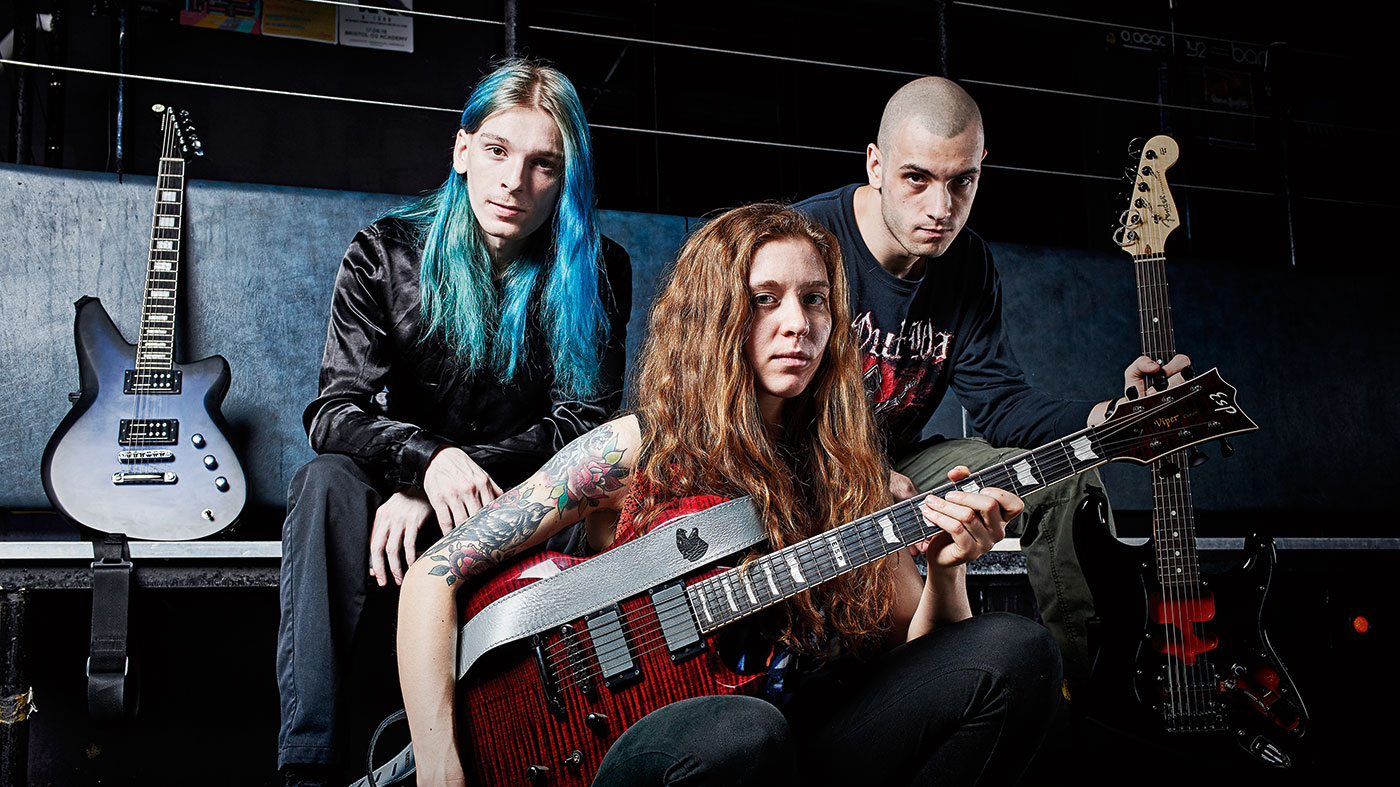
Want all the hottest music and gear news, reviews, deals, features and more, direct to your inbox? Sign up here.
You are now subscribed
Your newsletter sign-up was successful
There’s long been a notion that in order for a heavy band to achieve wider success, there has to be an element of compromise in pursuit of acceptance. Now we’re wondering if there’s any truth in that anymore because Pittsburgh quintet Code Orange have been one of the more unlikely rising stars in the world of heavy music in recent years.
They rubbed shoulders with the likes of Mastodon, Metallica and Queens of The Stone age at this year’s Grammys following their nomination for Best Metal Performance, while the likes of Killswitch Engage, Scott Ian, Corey Taylor (who guests on CO’s new The Hurt Will Go On EP) and Randy Blythe have become Code Orange converts.
We were pretty taken back by the Grammy thing... We all felt, ‘We did it…'
For a band pursuing such abject aggression - one that delves deep through a smorgasbord of hardcore, death metal and industrial in its church of unholy noise - it’s miraculous how Code Orange have managed to achieve mainstream success without any call for watering down their sound.
In fact, that uncompromising attitude could very well be the secret to their success. Here guitarists Eric 'Shade' Balderose, Reba Meyers and Dominic Landolina explain to TG the chemistry behind last year’s landmark third album Forever and the controlled chaos at the heart of their acclaimed live performances…
The Grammy recognition was a pleasant surprise for such a heavy band…
Eric: “That was really empowering… we felt thankful to be there. It was a crazy situation, being there to represent heavy music and new music. We want to show people you don’t have to do what everyone else does. You can be yourself and still get to the Grammys, doing your own thing with success and never having to compromise for anyone.
“The band have always believed in never changing for anyone. We continue evolving in the right way for what our vision is. I don’t want to say it’s all planned out, but the path is set for us to walk the path.
Want all the hottest music and gear news, reviews, deals, features and more, direct to your inbox? Sign up here.
“We started with just two guitars, bass and drums - then we brought Dom into the band and I switched to keyboards as well as guitars. That was the third evolution. When it all came together, we knew we could showcase the heavier sides of the band and the softer things.”
Reba: “We were pretty taken back by the Grammy thing, thinking, ‘Oh my god, they get it too!’ It was surprising. We had been building towards that for a very long time, people had to see us and notice us in order to get there. We know we belong in all those rooms, we deserve to be recognised in that kind of way. We all felt, ‘We did it… they get it now!’ It was very encouraging.”
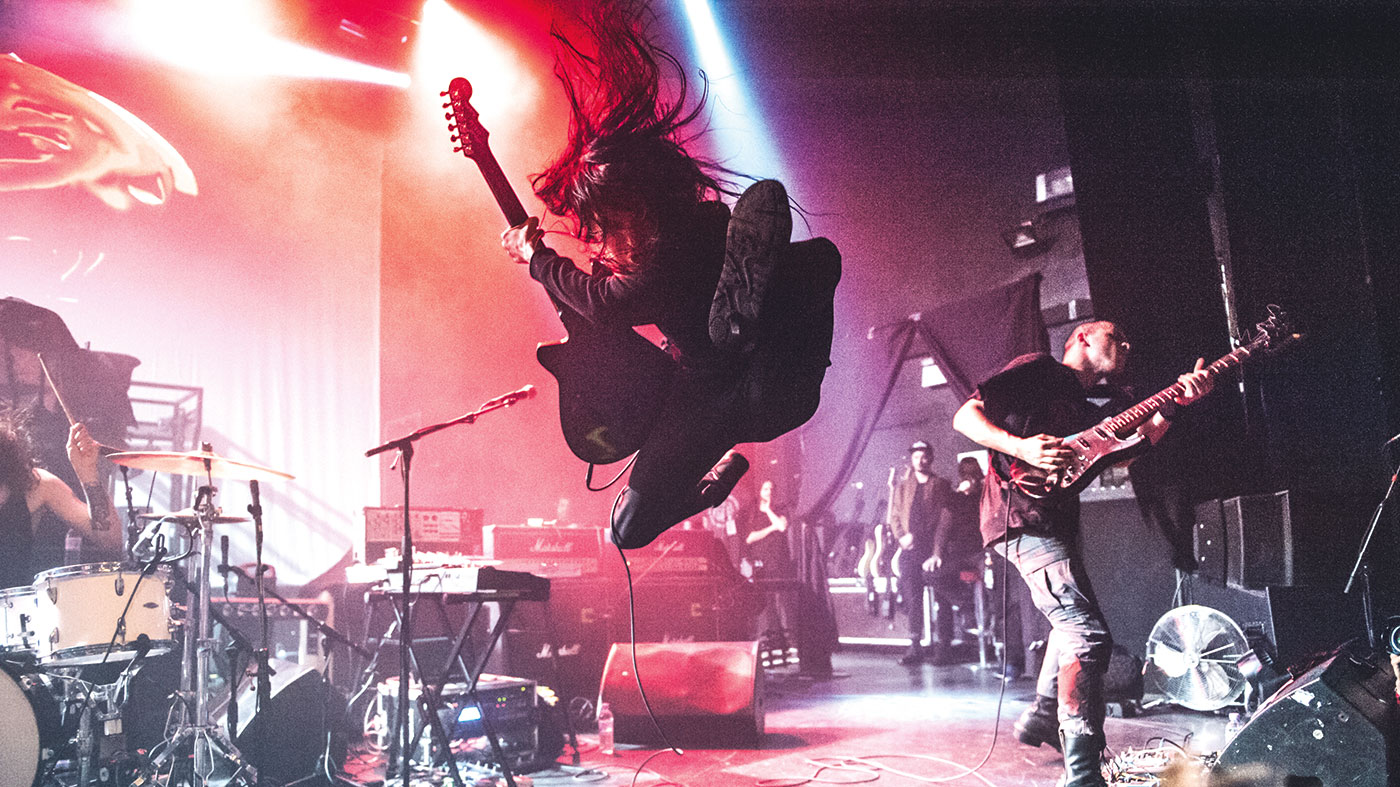
Natural born thrillers
So what do you think heavy music is lacking right now?
Reba: “For me, there’s a lack of real aggression and new natural influences. Every band I hear now are a rip-off of this or rehashing of that, and some of that stuff I even like, but for us it was all about discovering a new sound.
“It didn’t even happen consciously, we didn’t think about it, everything was natural. We all grew up together, even before Dom joined, he was our friend back in the day. We’d all share music together and came up with this mesh of influences and how to make it work, bringing a new kind of live aggression to the world. A lot of bands miss that too - they just stand there and play.
When we play, we are dying up there. We are breaking our backs and putting it all in to get that power
“When we play, we are dying up there. We are breaking our backs and putting it all in to get that power. There’s a lack of that passion right now, I think. It feels like it’s been forever since a young band took this kind of stance. It’s always the same shit and the same old bands from the last however many years. Some of them are good, I respect them and we learn from them, but our music is all about finding a whole new take on it.”
Eric: “The important thing with us that other bands miss is energy. When we write music, we try to ensure it all feels like music you would jump out of your skin to and feel something.”
What do you think are the key strengths of your guitar dynamic?
Dominic: “The parts Eric plays on are specifically chosen to add to our heaviness. Sometimes him, me and Reba will all be playing the same riff. Three guitars can make it so much heavier, so we do that on songs like My World and Spy, while songs like Bleeding In The Blur have Eric playing leads, while I stick to rhythm and Reba has her own part too. That entire song has this three-guitar dynamic, it makes our sound multi-dimensional.”
Look at how Pantera or Sepultura were back in the day, they all had this natural energy to their songs. It was never about some super-techy riff
Reba: “We write because of how it feels in the room. Look at how Pantera or Sepultura were back in the day, they all had this natural energy to their songs. It was never about some super-techy riff that was hard to play. It could even just be a sound, something that everyone in the room can’t help but feel.
“We don’t give a shit about what the typical structure should be; it’s about what we feel is right for our sound. We’ll sit there for an hour, more than an hour, even days, wondering why things aren’t working or don’t feel right. I think that’s why our music sounds so angry… it’s not put together the way most bands write. We’ll fuck about, spitting things at each other.
“It’s a lot easier when you’re playing around to have someone there to say, ‘That sounds good!’ That’s how you get more direction - it’s very collaborative with us. We know one of us in a room alone wouldn’t be as good, especially for all the layering. We just yell things out at each other and it almost doesn’t matter who physically is playing the instrument…”
Only one way
Speaking of Sepultura, you seem to utilise the two clashing notes favoured by Andreas Kisser to create tension on your own songs like Real and Kill The Creator…
Reba: “We like to do whatever sounds nastiest! We ripped those clashing notes from the older hardcore bands, though a lot of metal bands like Sepultura would incorporate those sounds in different ways too. Whatever sounds horrible!”
Bleeding In The Blur is one of the highlights of Forever and has some interesting 90s alt-rock influences. Where does that come from?
Sometimes you write songs and want to throw in all these notes and different chord structures, but you need to find that balance
Reba: “That’s probably me and Jami [Morgan, drums / vcoals] mainly. We got into that stuff together and actually used to be in a band back in the day that really had that 90s vibe. With Code Orange, we wanted to create a heavier version of it - taking inspiration from Nirvana, Soundgarden, Alice In Chains and even some shoegazey stuff, which creeps its way in through the amounts of reverb we use. We’ve always written songs like that, just never as good or as powerful. We wanted to make sure it felt like an anthem rather than just some throwaway ‘different’ track on the record.
“Sometimes you write songs and want to throw in all these notes and different chord structures, but you need to find that perfect balance. It needs that hooky melody, with not too much going on, but also with groove and aggression in there. I’m sure we’re going to write more songs like that. Only One Way, a new song we put out, has that kinda vibe too…”
What pedals do you use to create those massive washy swirls in your sound?
Reba: “I use EarthQuaker Devices for a lot of those sounds. The Sea Machine chorus has a really cool wavy kind of sound. I also use the TC Electronic Hall Of Fame Reverb on only one setting, but it’s the perfect one for us. On the record, I used one of the big Moog flanger pedals, which had this warbly effect. We used that on the song dream2 to create this crazy in-and-out kinda sound.”
Dominic: “I have the Electro-Harmonix Epitome pedal, which is a reverb, chorus, flanger and octave pedal all in one. That gets used pretty much throughout our set and I change the settings for pretty much every song. I do it all on the fly, when I get my 10 seconds to tune and flip some knobs! I like the shimmer setting, it brings a lot more treble and high-end, though I don’t need to use it much because Strats generally do that quite well already.”
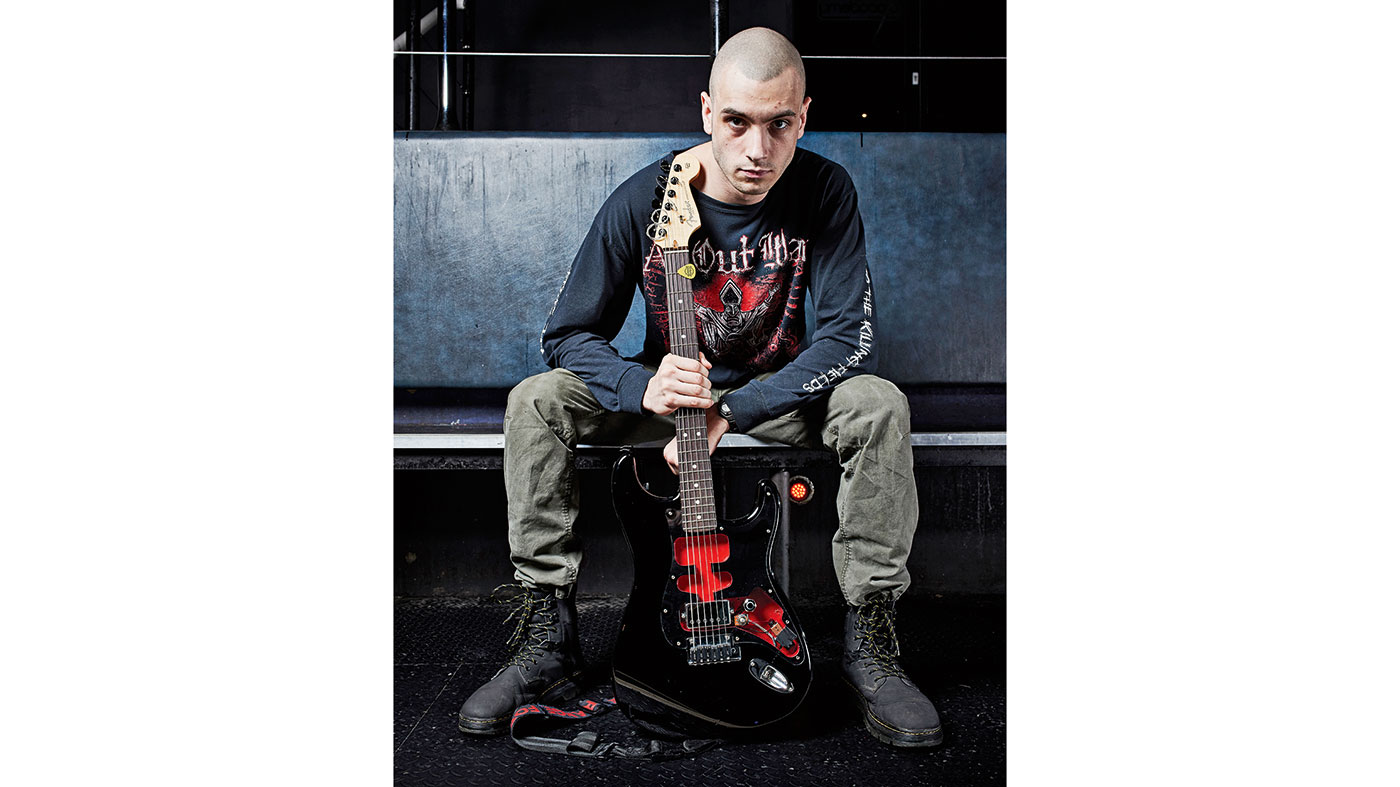
Tempo tension
The tempo shifts seem to hold the key to a lot of your heaviness… how much consideration goes into time changes?
Dominic: “Every step of the way when we are writing, we’ll be thinking about tempo. It’s a big thing and an important aspect of our music. We can use the shifts to make people feel a certain way, before going into the next part in the most dramatic way possible. It all came through practising hard and knowing more about how slowing down or speeding up can affect the power of what you are playing.”
We like creating that tension by changing tempo. It’s amazing how little tweaks can create more, ‘What the fuck?!’ moments
Reba: “We are all so scatter-brained that we always wanted to be constantly changing. Since Dom came into the band, we started analysing that aspect more, which is why it probably sounds more intentional.
“After playing music for all these years, we have this feel for making our songs more energetic - we like creating that tension by changing tempo. It’s amazing how little tweaks can create more, ‘What the fuck?!’ moments. It’s something a lot of bands don’t really do anymore. I actually hear it more in hip-hop, switching it up through different beats. We came to realise we had more in common with that world than some of the straight metal stuff.”
Eric: “We think about the live show. The last thing we want to do is be up there banging our heads for three straight minutes. That’s what every metal band in the world does, it’s devoid of feel, vibe and flow. Our live show sets us apart, so we make our records as close to that as possible.”
Finally, what advice do you have for all the other metal musicians out there hoping to make their own mark?
Just because I don’t know every trick in the book, it doesn’t mean that the ones I do use aren’t as good as the next guy’s
Eric: “Don’t try to copy anyone. You can reinvent without the need for that. Or you can create something totally new that no-one’s ever heard, your friends might think it’s shit - but there could be a ton of people out there that absolutely love it. If I didn’t have this band as a platform to put out my ideas, no-one would hear them. I’ve learned to trust myself. Just because I don’t know every trick in the book, it doesn’t mean that the ones I do use aren’t as good as the next guy’s.”
Reba: “We got a lot of fuckin’ hate early on in this band. Everyone told us we sucked and people would walk out while we played and wait for the next band. Well, guess fuckin’ what? We stuck around and those other bands haven’t done shit. And it’s because we believed in what we do.
“We trusted our instincts and worked hard, that’s the only way to get anywhere and it’s a rough road. Seek out like-minded people, stay loyal to them and create something different that you feel needs to be there.”
Code Orange's guitars
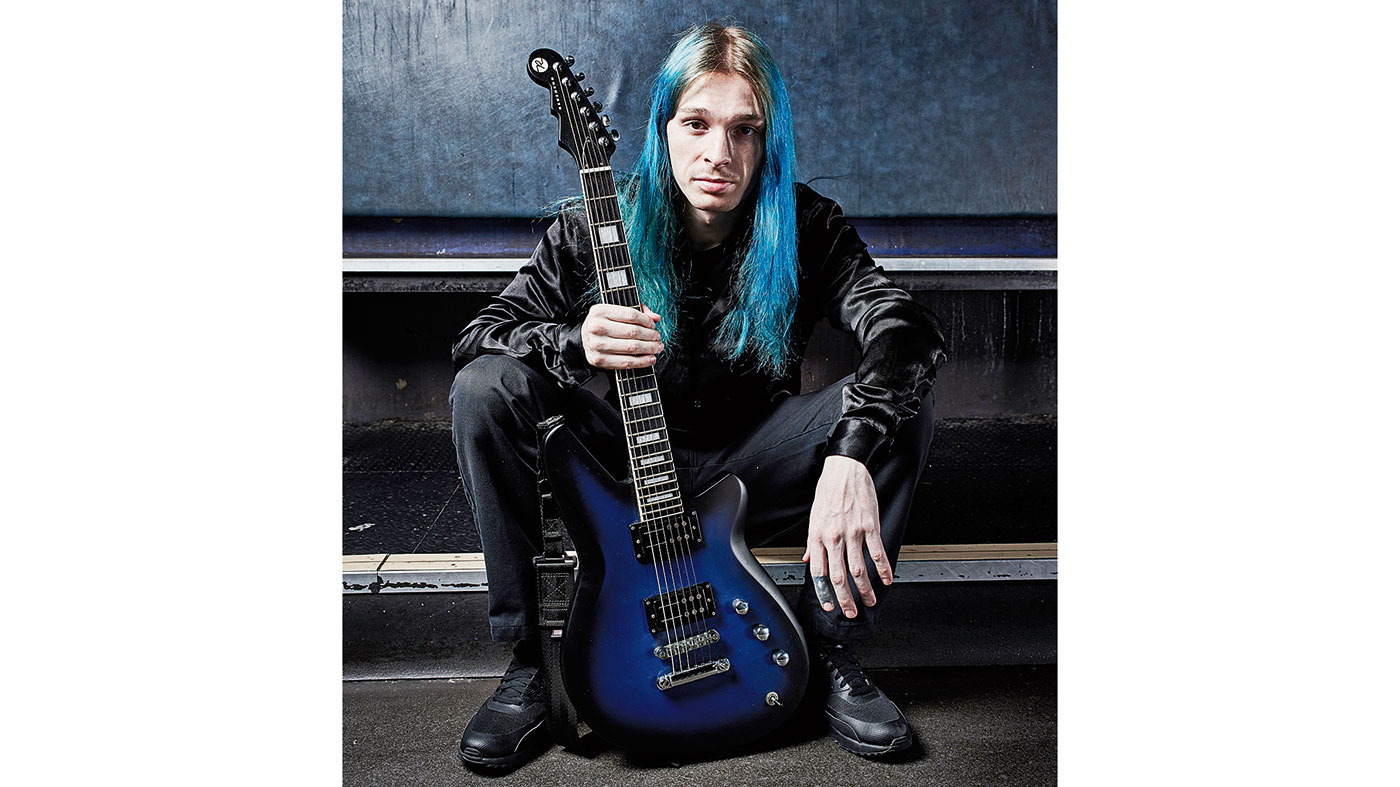
Eric Balderose - Reverend Shade Balderose
Eric: “I use my signature Reverend model - it’s pretty cool to have gotten this so early on. I bought a very similar guitar with the same body shape about six years ago - Jake Woodruff from Defeater is how I initially found out about them. The owner was super-nice and hands-on, he drove the guitar to me and ever since then, he’s been a really good friend in the music business. He will literally do anything for me, that’s what cultivated our relationship and years later when he was thinking of bringing the guitar back and potentially make it my signature, I thought it sounded fuckin’ awesome.
“I use Railhammer pickups in all the guitars - a Chisel bridge and a Hyper Vintage neck. People don’t notice this, but my volume knob is actually a push/pull killswitch.”
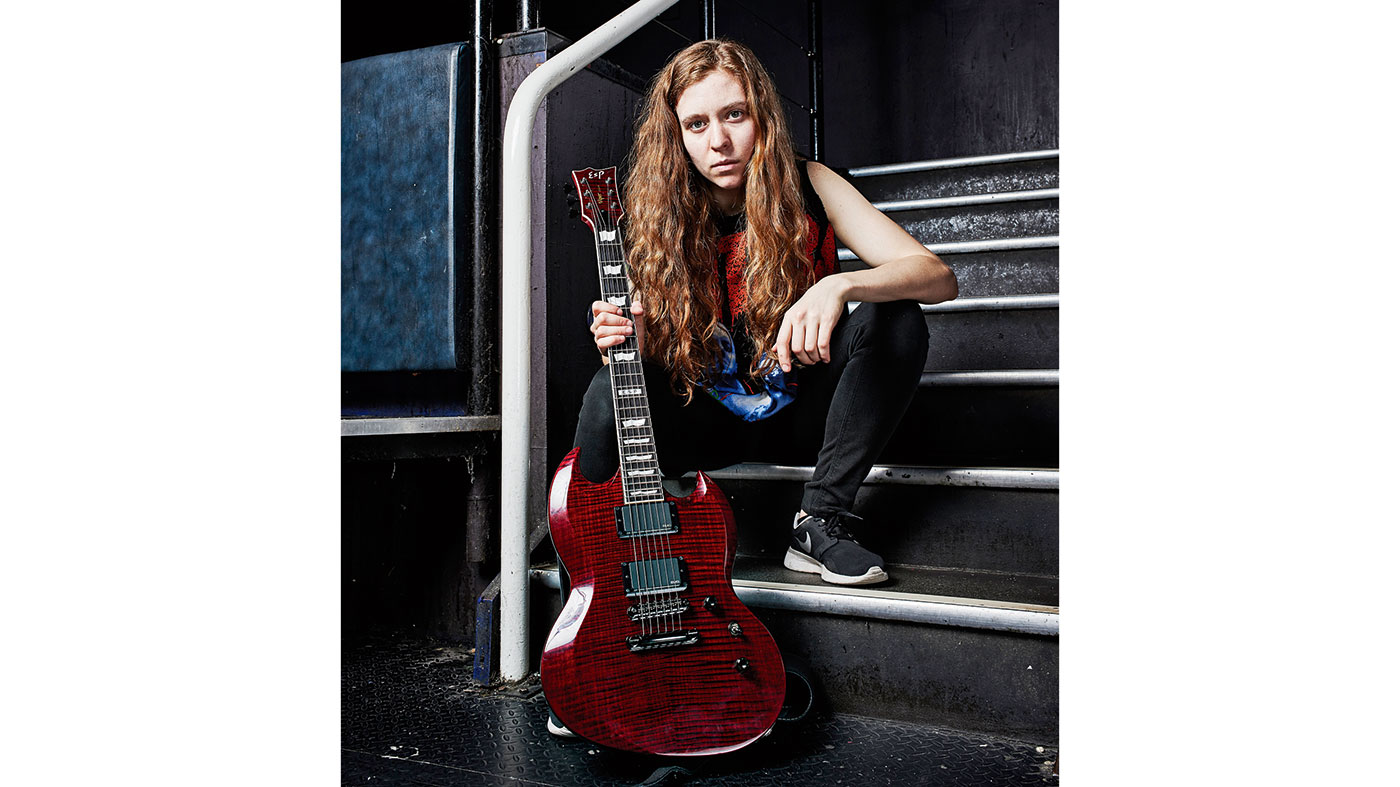
Reba Meyers - ESP LTD Viper 1000
Reba: “The balance of our three guitars works really well. My tone is definitely the deep-sounding one, while Dom is more shimmery and then that all gets topped off with synth pads in the background [provided by Eric], creating a clean layer that is a contrast to our heavy shit.
“At the beginning of Bleeding…, there’s that fog going on and I almost need it in order to envisage how my guitar will cut through. It’s hard to say why I ended up with Vipers, as a kid I just got what was there. I wasn’t picky, I didn’t have a dream guitar… it just fell into my lap and I grew to love it.
“To me, the guitar is less about all the little features, when you’re up there you just want something that feels right. I’ve been playing Vipers for years, they became attached to me, almost like they are a part of my body. I feel weird playing anything else, the weight is just right for me.”

Dominic Landolina - Streamlined Fender Stratocaster
Dominic: “I guess not many people use Strats in this kind of heavy music. I’ve had different EMGs I’ve been trying out since I started in the band. The guitar I’m playing tonight has a 57 in the bridge, that’s the only pickup in there.
“In my other guitar, there’s an 81 plus a neck and middle pickup, but I ended up realising I never needed them. I didn’t even touch the tone knobs so I decided to keep it simple: one pickup, a kill button and a volume knob.”
Amit has been writing for titles like Total Guitar, MusicRadar and Guitar World for over a decade and counts Richie Kotzen, Guthrie Govan and Jeff Beck among his primary influences. He's interviewed everyone from Ozzy Osbourne and Lemmy to Slash and Jimmy Page, and once even traded solos with a member of Slayer on a track released internationally. As a session guitarist, he's played alongside members of Judas Priest and Uriah Heep in London ensemble Metalworks, as well as handling lead guitars for legends like Glen Matlock (Sex Pistols, The Faces) and Stu Hamm (Steve Vai, Joe Satriani, G3).


